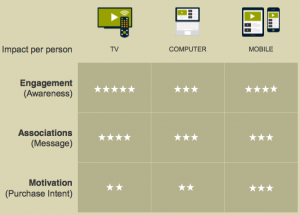What marketing lies are you telling yourself? Contributor Joe Hyland comes clean with five marketing misconceptions that he’s pledging to overcome.

Marketers, if trust is our greatest currency, why are we lying so much?
Apologies in advance for the cynicism — maybe I woke up on the wrong side of the bed this morning, or the traffic was more frustrating than usual. But, when I sat down to write this column, all I could think about was how sick and tired I am of the same old marketing BS.
You know what I’m talking about — all the jargon-ridden claims from martech vendors that sound really cool but don’t mean much. I can’t tell you how many times I’ve gotten to the end of a web page, email or white paper and thought, wait, what does that company actually do, why should I care, and how will this technology actually live up to its promise?
Then, I stopped myself mid-rant and remembered the words of my former boss: A problem identified is half-solved. Rather than complaining, I spent some time reflecting on what it will take for our industry to get real. I realized that as a CMO of a marketing technology company, it starts with me.
So, I’m coming clean and confessing where I’ve blurred fact with fiction. Here are the five lies I’m pledging to stop. I encourage you to join me.
1. We need all the solutions that make up our martech stack
Think of all the vendors that make up your growing martech stack. If you’re like me, you chose the best solutions on the market — or so you think. Too many marketers today are purchasing fad solutions they either don’t understand or solutions that don’t move the company’s bottom line.
Part of my job is to analyze the dozens (hundreds) of solutions available to marketers today and to separate fact from fiction. Call it competitive analysis.
In my search to better understand these solutions, I’ve witnessed the volumes of vague, nebulous pitches out there, all saying that they do everything a marketer needs to engage, convert and win over prospects. All of these loud, exaggerated proclamations have created a martech echo chamber, and it’s starting to drown out what really matters.
The truth is, marketers want products to answer three basic questions: Does it make my life easier? Will it impress my boss? And will it make the company money? Slice it, dice it and overcomplicate it as much as you want, but those are the questions that we are all asking ourselves. Answer those three questions succinctly and you’ve earned a marketer’s, or at least this marketer’s, business.
2. ABM is the next big thing
Another year, another marketing trend. This year, Account-Based Marketing (ABM) burst onto the CMO agenda from all directions. Each day, articles are written and startups are launched that all focus on bringing the tenets of ABM to the masses. Some marketers are hailing it as the ultimate marketing strategy moving forward.
Interestingly, the latest research from Forrester analyst Laura Ramos finds that most companies are just starting their ABM strategy, and it’s not as massive a movement as vendors lead you to believe.
And those results make me wonder, is that because we’ve been doing an ABM strategy all along? Sure, there are improved tactics to execute campaigns focused on a specific account, but having high-touch, personalized campaigns has always been a good marketing strategy.
New ABM technologies are effective for carrying out a more targeted approach, no doubt. But the rules for how to engage with the people inside those accounts still stand. Whether you’re focused on a particular vertical or company, the objective is to know who your buyer is and have a conversation with them, no matter what acronym it’s named.
3. Our martech stack is integrated
Just the other day, I was talking to our marketing operations lead and asked whether a solution we were evaluating integrated with our marketing automation platform. When he replied, “Hey, I’m just glad it integrates with our system at all,” I was pretty taken aback. Then, when he explained that most martech solutions define integration pretty loosely and still require a significant lift to make them work, I started to question everything.
While the back-end management of the martech stack does not necessarily fall on the list of a marketer’s responsibilities, it’s an important consideration that is often overlooked. The default response is to assume that any service you purchase will work effortlessly with the other services and databases currently in operation. Yet 43 percent of marketers are hampered by integration requirements, according to Ascend2’s “Marketing Technology ROI Survey.”
The truth is that integration and interoperability are vitally important. Choose the vendors that make life easier for both your marketing team and the folks in IT and operations.
If you prefer a stack that looks like a sponsorship page of a martech conference, be sure all the logos play nice with one another. Otherwise, you’ll pay for it in lost time and splintered data. And if you’re not sure, ask your ops leader!
4. The more leads, the better our results
The days of quantity over quality are over. In practically every industry, from media to retail, there is a growing movement toward high-touch experiences.
I think every marketer would agree: The only valuable prospects are the ones that convert; all the others are just wasted time and lessons learned. So, why, then, do marketers continue to share prospects who have clicked on one link in an email? Because we’re not focusing on the quality of their engagement.
Instead, redefine how you’re qualifying those leads and change the metrics that evaluate a prospect’s likelihood to purchase. Simple tweaks like focusing on how much time a customer has spent with your content, or whether they have answered any questions when prompted, can surface higher-quality MQLs (marketing qualified leads). I would rather have 100 highly engaged prospects from an event than a pipeline of 5,000 contacts we got from a form fill. There’s a difference!
5. Our data is reliable and accurate
How much of your CRM data is garbage? Chances are, probably most of it. But, don’t feel bad — it’s unavoidable and a moving target. In our rush to auto-populate our contact databases, we forgot that the quality of the information we put in dictates the effectiveness of what we put out. And no matter how fast we grow our database, it will never keep up with how quickly businesses evolve and people change.
Data that’s worth anything is structured, dynamically updated and includes insights beyond just their contact details. Otherwise, a database can mislead and cause some cringeworthy mistakes. Outsourced lists may be fine to get an email address or a phone number, but don’t rely on them to personalize prospect outreach.
To understand more than just how to get a hold of someone, start capturing prospects’ and customers’ behavior as they interact with your content. Helping a salesperson know a buyer’s pain point, rather than assume it, is powerful. Those are the insights that separate a list of names from real sales opportunities.
It’s time we all ‘fess up
Whew, I feel much better now! And, if this article has made you upset, channel that anger into ‘fessing up to your own marketing misconceptions… because being honest about our problems is the only way to move past them.
Opinions expressed in this article are those of the guest author and not necessarily Marketing Land. Staff authors are listed here.
Marketing Land – Internet Marketing News, Strategies & Tips
(81)
Report Post









